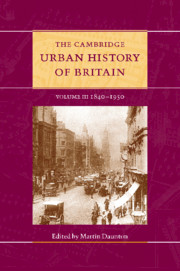Book contents
- Frontmatter
- 1 Introduction
- Part I Circulation
- Part II Governance
- Part III Construction
- 14 Patterns on the ground: urban forms, residential structure and the social construction of space
- 15 Land, property and planning
- 16 The evolution of Britain’s urban built environment
- 17 The planners and the public
- Part IV Getting and spending
- Part V Images
- Select bibliography
- Index
- Plates 1-7
- Plates 8-14
- Plates 15-20
- Plates 21-27
- Plates 28-34
- Plates 35-41
- Plates 42-48>
- Plates 49-53
- References
14 - Patterns on the ground: urban forms, residential structure and the social construction of space
from Part III - Construction
Published online by Cambridge University Press: 28 March 2008
- Frontmatter
- 1 Introduction
- Part I Circulation
- Part II Governance
- Part III Construction
- 14 Patterns on the ground: urban forms, residential structure and the social construction of space
- 15 Land, property and planning
- 16 The evolution of Britain’s urban built environment
- 17 The planners and the public
- Part IV Getting and spending
- Part V Images
- Select bibliography
- Index
- Plates 1-7
- Plates 8-14
- Plates 15-20
- Plates 21-27
- Plates 28-34
- Plates 35-41
- Plates 42-48>
- Plates 49-53
- References
Summary
INTRODUCTION
It can be suggested that the analysis of space is particularly relevant to large urban areas. There is general acknowledgement in much sociological and geographical literature that the processes of modernisation and urbanisation have both changed the ways in which spaces are used and created feelings of placelessness in urban areas. Whilst reviewing studies of the cultural meaning of space, R. Rotenberg suggests that ‘urban agglomeration invites special treatments of space’, whilst M. La Gory and J. Pipkin develop a more extended argument supporting the significance of space for urban areas:
Spatial structure is particularly important to the city, for urban society is composed of diverse groups living close to one another. The city is a compact community. Land is relatively scarce; thus the urban space is necessarily highly organized and segregated. Space is a major social force literally shaping the lives of those within the urban container. We make the city, but once created it remakes us. The buildings we occupy and the neighborhoods we reside in restrict our activities. The buildings and neighborhoods not only limit our social participation but also influence what we think and feel about others who share our city.
Keywords
- Type
- Chapter
- Information
- The Cambridge Urban History of Britain , pp. 427 - 466Publisher: Cambridge University PressPrint publication year: 2001
References
- 3
- Cited by

